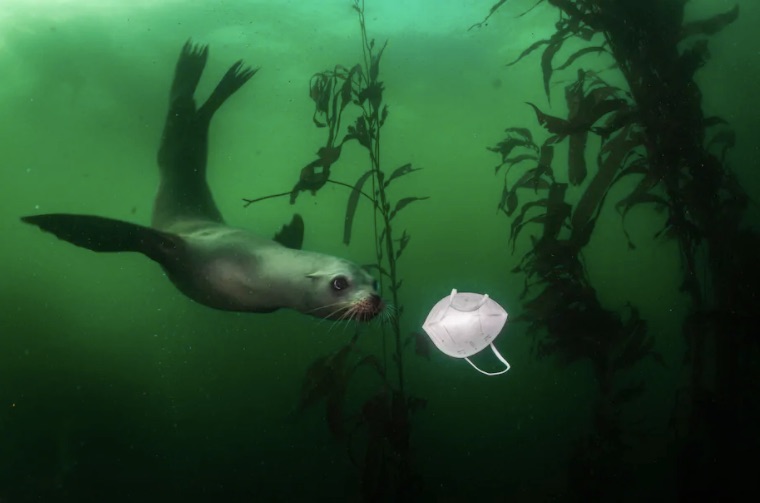Some used face masks could be compared to cigarette butts. Tossed aside or dislodged from pockets, they wind up on sidewalks, in storm drains, floating down our waterways. Containing plastics, face mask pollution will add to our waste.
Face Mask Pollution
When we discard the estimated 129 billion masks and 65 billion gloves that we use each month to protect ourselves, the world winds up with a gargantuan extra amount of plastic waste. During a California Cleanup month last September, masks, gloves, and other PPEs ranked 12 in a 50 category trash list.
It is also possible though that we recycled our plastics. Still, their destination would not have been what we wanted. From all of the plastic waste we generate, just nine percent is recycled:
After they are picked up, plastics get sorted and then, depending on their resin type, might be sold. Plastic bottles and clear plastic cups are Number 1s that will sell for 13 cents (or so) a pound. Fetching more, the Number 2s are the milk bottles and shampoo containers that could be worth 60 cents a pound. The Number 5s–including our prescription and yogurt containers–also can be sold. Happily, the purchased plastics will become new bottles, toothbrushes, carpets and clothing, until they’ve been reused too many times. As for the Number 3s, 4s, 6s, and 7s, getting rid of them costs the money it takes to dump them in a landfill or ship them somewhere (but not to China because, in 2017, they started to refuse the plastic waste they had been buying from us).
Our Bottom Line: Incentive
We could better grasp the significance of our plastic accumulation if we visited Bethel, Alaska. Located in a section of Southwest Alaska, this city of 6,500 people is the area’s metropolis. For medical care, for shopping, Bethel is where you go. Nearby, 56 Alaska Native tribes live in small groups of several hundred or so.
However, it’s not so easy to visit Bethel because it is located on a subarctic tundra wetland. Crisscrossed by a network of ponds and streams, it never connected to the state’s road system. Instead, the only way to access the city is by plane or boat and sometimes a truck when the river is frozen. Yes, cargo planes and barges bring their food, medicine, and cars. But moving anything in the other direction is the problem. As a result, residents dump their junk, old cars, and worn out appliances in backyards, empty stretches of road, and landfills.
Perhaps our incentives on the earth are more similar to Bethel than we realize. Thrown out with the garbage, our face mask pollution is probably accumulating somewhere.
My sources and more: Thanks to 99% Invisible for the story of Bethel. Then, having read about face mask pollution problems here, I waited for a related article. It came from WSJ and The Numbers Lady. (Please note that our featured image is from The Washington Post and I’ve quoted some sections of a previous econlife post on Bethel.)







